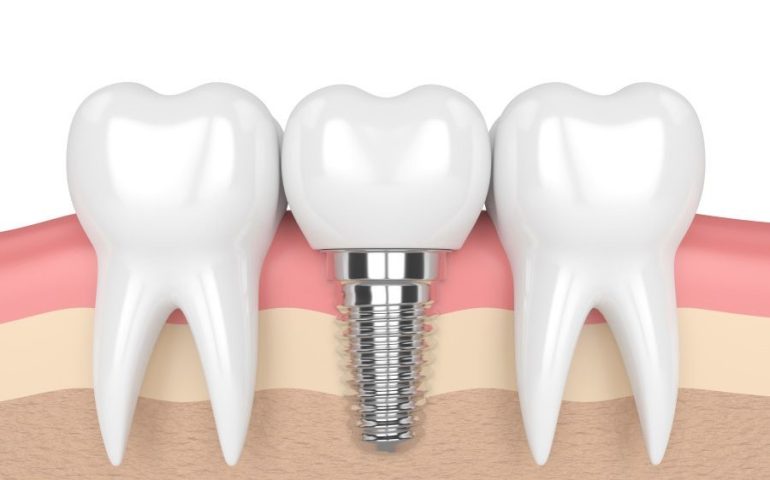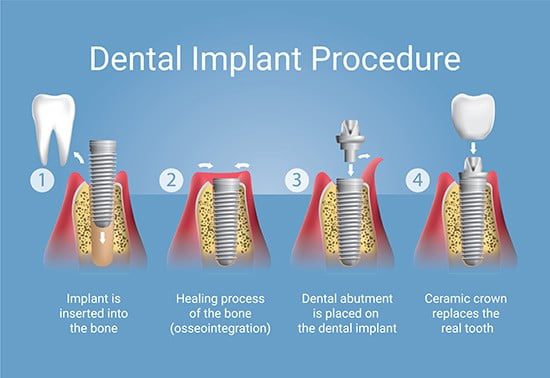Dental Implant
What are the advantages of Implant?

- Implant restores aesthetic and function after loss of tooth. Implant prosthesis are stable because there is strong bond between implant and bone.
- Implant become part of jaw bone and maintain its height and width. Preservation of jaw bone create youthful appearance.
- Implant gets support from natural bone like tooth root so there is no support from neighboring teeth and no damage to natural teeth.
- Implant do not decay (caries)like natural tooth. Modern implant has success rate of 90 percent.
What are the requirements for an Implant?
Implant is best solution for missing tooth. For Implant to be successful it is recommended:
- Age: Seventeen year for female and eighteen years for male. Jaw bone complete around this age. Jaw bone completion is required for implant placement.
- Bone Height minimum 10 to 12 mm and bone Width minimum 7mm for standard implant. Standard Implant is 10 mm long and 4 mm wide in diameter. Minimum 1.5 mm bone is required around all site of implant for successful result. In cases with deficient bone, bone grafting and guided bone regeneration (GBR) are commonly used to increase height and width of bone. Sinus lifting procedure is used in posterior maxilla with bone grafting to increase bone height and width. Small size implants are available and can be placed in mild bone deficiency cases.
- Healthy oral tissues (soft tissue, bone): Healthy oral tissue with no infection is ideal for successful implant placement. Acute infection is absolute contraindication for implant placement.
- Medical Health (Systemic Health): Patient should be medical fit with no active disease. Metabolic disease like diabetes, bone disease, hypertension should be control before implant placement. Patient overall medical health, severity of disease and medicine in use is evaluated for suitability of implant. Patient is referred to physician to control medical disease. Implant is placed after medical disease is well controlled.
- Atraumatic Surgery: Implant placement requires excellent surgical skills to respect both soft tissue (gum) and hard tissue (bone). Precise incision of soft tissue, flap design according to surgery demand and reflection of flap without tear, accurate suturing is key for soft tissue healing after implant placement. Bone is prevented from heat during surgery by generous saline irrigation, intermittent drilling and sharp good quality burs from well recognized company’s kit.
- Implant Specialist: Implant placement is a technique sensitive procedure and require expertise and experience for best result. Special drills (burs) are used in sequence keeping in view bone type. Precise angulation placement is required for excellent aesthetic and function.
- Sterilization and Aseptic technique: Implant surgery require high quality sterilization and aseptic technique. Sterilization prevent infection and ensure successful healing and osteointegration.
- Safety Protocol for Nerve and Sinuses: It is advised to stay 2 mm away from vita structure like nerve, maxillary sinus, mental foemen. In critical cases, multiple radiographs and CBCT are advised for accurately treatment plaining.
Wound care and Medication: Patient need to follow instructions after implant surgery and avoid smoking preferably for 2 to 3 days. Painkillers are advised after implant surgery to control pain. In few cases antibiotics are also advised. Patient is advised to keep oral hygiene excellent and antiseptic mouthwash like chlorohexidine is advised.
Implant Procedure.

Implant surgery is minor oral surgery equivalent to simple tooth extraction. It is performed under local anesthesia that anaesthize (numb) the area for implant placement. Specialized implant drills are used to prepare bone.
Implant fixture (root) is screwed (placed) into bone. Implant is made of titanium alloy that is biocompatible (body friendly). Bone fuses with implant to form strong bond with implant in 3 to 6 months. After that implant abutment is placed over implant screw (root). Implant Abutment is loaded with crown, bridge and denture.
What are the side effects of an Implant?
These are like minor oral surgery e.g., tooth extraction. Mild pain and swelling are expected after surgery that are easily controlled by painkiller. Accurate plaining and atraumatic surgical approach prevent complication. Implant have success rate of 90 percent.

